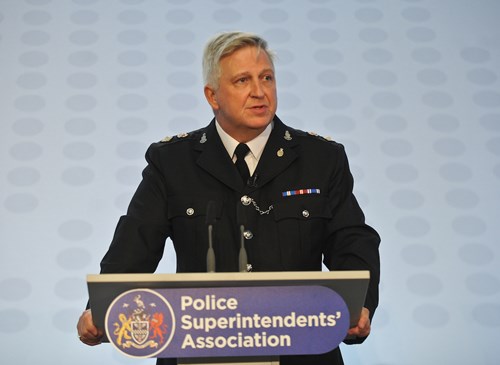Superintendents should lead by example on welfare and wellbeing
25 September 2018

Superintendents have been asked to ‘lead by example’ when it comes to welfare and wellbeing.
Outgoing Superintendents Association President Gavin Thomas told delegates at the organisation’s annual conference that they had a leadership role to play in helping officers improve their mental and physical health at work.
“Many of you will have heard me challenge ourselves as leaders in the service,” he said.
“We have a responsibility now and tomorrow to change our behaviour and our language and help those we lead to do the same… to break the cycle of long hours and presenteeism, to bust the dangerous myth that you can only be a good performer if you work long hours.
“We are police officers. We joined to serve the public, it goes without saying that we will always give extra of ourselves, especially in emergencies and operational situations.
“I can assure you that policing will not fall apart because someone needed to have a day off sick or take a rest day.
“So, please, for your own health, and that of your teams, demonstrate by your leadership that presenteeism is not the norm,” he urged delegates.
Much of that is about is ensuring the amount of hours worked by officers and other ranks is properly recorded, he added.
He’s written to all Chief Constables asking about their compliance with Working Time Regulation requirements.
“The response from forces highlighted that, for the majority in the Superintendent ranks, there is no proper oversight of the hours they are working, that accurate records are not being kept and that the excessive hours worked by you (Superintendents) is having a real effect on your health and wellbeing,” he said.
“There are two points here - firstly, if our ambition is to move from a time-served pay structure to one that reflects individuals’ contribution and roles, then a fundamental element of this is knowing how many hours your people are working, and what they are doing in that time.
“Secondly, information and analysis of people’s working patterns will evidence that the current operating models are only achievable if you, and your teams, continue to work harder and longer.
“Clearly this is unsustainable - as a service, we must make this case ahead of the next Comprehensive Spending Review,” he said.
He added that there had been an enormous amount of change during his two and a half years in the role, but that one constant had been the relentless pressure placed on officers.
“We have seen this manifested in capacity, demand and people,” he said.
“Put bluntly, policing is now utterly reliant on fewer people working longer and harder and for you, our members, this has resulted in a major increase in expectations on you.
“Bigger commands, both in size and scope - more complexity, more risk, and more demand, smaller teams, fewer resources, less support.
“Another constant has been your tireless commitment to getting the job done whatever the consequences for you.”
The stresses and strains of the job have been reflected in the Association’s most recent resilience survey which revealed that half of all Superintendents’ showed signs of anxiety and that a huge 94% worked or were contactable while on holiday.
“’The job’ is the people, all of us in this room and the many colleagues we have worked with over the years some sadly not with us anymore,” Gavin said.
“They are what make it. Look after them. Look after each other - policing is built on people and we forsake them at our peril, he said.
“I could not be prouder to have been given the opportunity to be your President and to represent our great Association.”

















